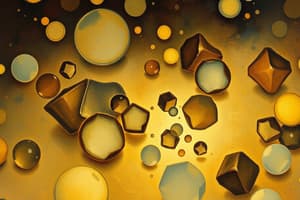Podcast
Questions and Answers
What is the definition of chemistry?
What is the definition of chemistry?
- The analysis of chemical reactions occurring in laboratories.
- The study of matter and its properties, changes, and related energy. (correct)
- The evaluation of environmental impacts of various chemicals.
- The study of living organisms and their biochemical processes.
Which branch of chemistry focuses on the compounds of carbon?
Which branch of chemistry focuses on the compounds of carbon?
- Physical Chemistry
- Biochemistry
- Organic Chemistry (correct)
- Inorganic Chemistry
What does physical chemistry study?
What does physical chemistry study?
- The industrial applications of chemical processes.
- The quantification of chemical substances in mixtures.
- The properties of biological compounds.
- The theoretical aspects of matter's structure and changes. (correct)
Which of the following best describes analytical chemistry?
Which of the following best describes analytical chemistry?
Colloid chemistry studies which of the following?
Colloid chemistry studies which of the following?
What does electrochemistry focus on?
What does electrochemistry focus on?
Which branch of chemistry is concerned with the study of radioactivity?
Which branch of chemistry is concerned with the study of radioactivity?
What characterizes a pure substance?
What characterizes a pure substance?
Which of the following is NOT a branch of chemistry?
Which of the following is NOT a branch of chemistry?
Which statement about elements is true?
Which statement about elements is true?
Where are non-metals located on the periodic table?
Where are non-metals located on the periodic table?
What is a key characteristic of metalloids?
What is a key characteristic of metalloids?
How is a compound formed?
How is a compound formed?
What defines an acid in terms of its behavior in water?
What defines an acid in terms of its behavior in water?
Which of the following best describes an oxide?
Which of the following best describes an oxide?
What characteristic defines a gas in terms of volume and shape?
What characteristic defines a gas in terms of volume and shape?
What is the role of bases in water?
What is the role of bases in water?
Which property of matter is independent of its quantity?
Which property of matter is independent of its quantity?
What term describes a property observable without a change in the substance?
What term describes a property observable without a change in the substance?
What is plasma best described as?
What is plasma best described as?
Which of the following is an extensive property?
Which of the following is an extensive property?
Which of the following substances is considered the most malleable?
Which of the following substances is considered the most malleable?
What property indicates a material's ability to reflect light?
What property indicates a material's ability to reflect light?
Which property describes a material that is easily broken?
Which property describes a material that is easily broken?
Which type of mixture retains the individual properties of its components?
Which type of mixture retains the individual properties of its components?
What best describes a colloid?
What best describes a colloid?
Which of the following statements about solutions is true?
Which of the following statements about solutions is true?
Which of the following is NOT a characteristic of suspensions?
Which of the following is NOT a characteristic of suspensions?
What is the primary difference between a solute and a solvent?
What is the primary difference between a solute and a solvent?
Which type of mixture is classified as homogeneous?
Which type of mixture is classified as homogeneous?
Which statement accurately describes a solid?
Which statement accurately describes a solid?
In what way do liquids differ from solids?
In what way do liquids differ from solids?
Study Notes
Definition of Chemistry
- Chemistry explores matter, its properties, composition, changes, and the energy involved in these changes.
- Matter is defined as anything with mass that occupies space.
- Mass refers to the quantity of matter in an object.
- Energy is the ability of matter to perform work.
Branches of Chemistry
- Organic Chemistry: Focuses on compounds containing carbon.
- Inorganic Chemistry: Studies all elements and compounds except organic compounds.
- Physical Chemistry: Investigates theoretical aspects of matter's structure and changes.
- Analytical Chemistry: Analyzes the presence and amount of substances through quantitative and qualitative methods.
- Biochemistry: Examines the chemistry of biologically significant elements and compounds.
- Chemical Engineering: Merges chemistry and engineering to improve industrial processes.
- Colloid Chemistry: Studies particles larger than ordinary molecules and smaller than visible objects; focuses on materials like rubber and viruses.
- Electrochemistry: Explores chemical reactions that create or are influenced by electric current; includes electrical conductivity phenomena.
- Nuclear Chemistry: Investigates radioactivity and nuclear processes.
Forms of Matter
- Pure Substance: Uniform composition; can be categorized into elements or compounds.
- Elements: Simplest forms of matter with specific properties.
- Periodic Table: A systematic arrangement showing periodic variation in elements; metals on the left, nonmetals on the right, metalloids in between.
Atomic Theory
- Atoms are the smallest units of an element maintaining the element's characteristics and cannot be divided by chemical means.
- Leucippus and Democritus proposed the idea that matter consists of indivisible particles called atoms.
Classification of Elements
- Metals: Good conductors of heat and electricity; often combine with hydroxyl groups.
- Non-Metals: Typically react with water to form acids; poor conductors; termed insulators.
- Metalloids: Exhibit properties of both metals and non-metals; also known as semiconductors.
Compounds and Mixtures
- Compounds: Combinations of elements, decomposable only through chemical reactions, with consistent molecular makeup.
- Molecule: Smallest part of a compound retaining its chemical properties.
- Mixtures: Composed of two or more components retaining individual properties; categorized into solutions, colloids, and suspensions.
Solutions
- Components include solutes (dissolved substances) and solvents (dissolving medium).
- Mixtures can be gas-gas, liquid-gas, gas-solid, liquid-liquid, etc.
Colloids and Suspensions
- Colloids: Intermediate particles size, between solutions and suspensions; appear cloudy.
- Suspensions: Heterogeneous mixtures with larger particles that can settle over time.
States of Matter
- Solid: Definite shape and volume; particles tightly packed.
- Liquid: Definite volume but conforms to the container's shape; particles are close but not rigid.
- Gas: No definite shape or volume; particles move freely and expansively.
- Plasma: Electrically charged gas state; most common phase in the universe (e.g., stars).
- Bose-Einstein Condensate: Forms near absolute zero, exhibiting superconductive properties.
Properties of Matter
- Physical Properties: Observable without altering the substance (e.g., mass, volume).
- Intensive Properties: Independent of the sample size (e.g., boiling point).
- Extensive Properties: Dependent on the amount present (e.g., mass, volume).
- Chemical Properties: Involve a substance's reactivity and interactions with other substances.
General and Specific Properties
- General Properties: Exist in all materials (e.g., density, mass, weight).
- Specific Properties: Unique to materials (e.g., hardness, malleability).
Key Specific Properties of Materials
- Hardness: Resistance to cutting; diamonds are exceedingly hard.
- Malleability: Ability to be hammered without breaking; gold is the most malleable metal.
- Tenacity: Strength under stress; steel is known for high tenacity.
- Luster: Reflectivity; metals and precious stones exhibit high luster.
- Brittleness: Tendency to break easily; examples include glass and ceramics.
Studying That Suits You
Use AI to generate personalized quizzes and flashcards to suit your learning preferences.
Related Documents
Description
This quiz provides an overview of the fundamental concepts of chemistry, focusing on the definition of chemistry, the study of matter, and its properties. It explores essential terms such as mass and energy, as well as the various branches of chemistry. Test your understanding of these foundational ideas!




